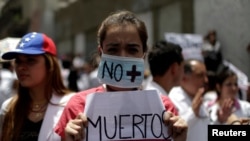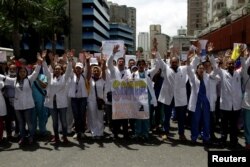The U.N. Security Council held a closed door meeting Wednesday to discuss the deteriorating situation in Venezuela, where anti-government protests have rocked the country for more than six weeks, amid a worsening economic and humanitarian situation.
The United States called for the meeting, which marks the first time the 15-nation council, which is responsible for international peace and security, has taken up the matter.
“In Venezuela, we are on the verge of a humanitarian crisis,” U.S. ambassador Nikki Haley said ahead of the meeting. “Peaceful protestors have been injured, arrested and even killed by their own government. Medicine is unavailable, hospitals lack supplies, and it's become difficult to find food.”
Protests continue
For the past six weeks, Venezuela has been shaken by near-daily anti-government street demonstrations aimed at removing President Nicolas Maduro from power. At least 43 people have been killed in the unrest.
Protesters are angry about the socialist country's downward economic spiral, which has led to food and medical supply shortages, and they blame Maduro for wrecking the economy.
Maduro blames the opposition for the country's problems, accusing his opponents of launching a coup against him with the support of Washington. On Tuesday, he extended the country's state of emergency for the seventh time.
The regional bloc Union of South American Nations (UNASUR) and the Vatican have separately tried to mediate the crisis.
“We're not for the opposition, we're not for President Maduro, we're for the Venezuelan people,” Ambassador Haley told reporters after the meeting. She added that Washington supports a regional solution to the crisis.
Venezuela's U.N. envoy Rafael Ramirez rejected what he called U.S. intervention in his country. “They have to understand that we need and we are asking for respect for our position, our decision and our sovereignty,” he said.
A regional issue
Not all council members thought the Security Council should take up the issue.
“We are not facing a threat to international peace and security in Venezuela, not even on a regional level,” Bolivian ambassador Sacha Llorenti told reporters.
“We prefer to maintain the issue within the realm of the regional organizations,” Uruguay's Ambassador Elbio Rosselli said after the meeting.
“We understand that the only way to come out of this is through an agreement between the Venezuelan political actors,” Rosselli added. “They themselves are the ones who have to take the situation in their hands and carry through negotiations to a satisfactory outcome.”
'A source of concern'
U.N. Secretary-General António Guterres has been following the situation very closely, his spokesman told reporters. “Obviously, it is a source of concern, not only because of the political situation, but also due to the difficult economic and social situation we are seeing,” Stephane Dujarric said.
He said Guterres, who is in Europe, has been conducting telephone diplomacy with the various mediators to help resolve the crisis.








